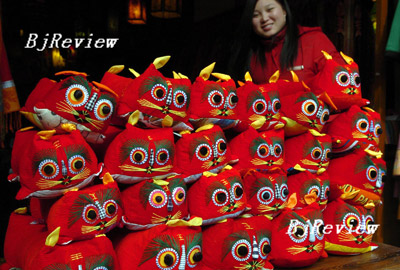
In the meantime, foreign festivals like Valentine's Day and Christmas Day are gaining in popularity, especially among China's youth, which again has caused worry about the future of Chinese traditions.
A couple of months ago a group of Ph.D students from several of China's biggest and best universities publicly released a letter calling for a Chinese boycott of Christmas--a holiday they see as representing waning interest in traditional Chinese culture--as well as other non-native cultural trends.
If the reaction of Chinese bloggers is anything to go by their stance has little support. "Look how Japan and Korea's worship of Western culture always surpasses ours, yet they've preserved traditional culture a hundred times better than we have," argued one Chinese netizen. "Taiwan and Hong Kong are more Westernized than us, yet have preserved Chinese culture better than we have. They thought boycotting Occidental culture would let them keep their own culture? Nonsense."
Chen Jing, a professor of Chinese folk art at Nanjing University based in Jiangsu Province, has urged the government to lodge an application to list the Spring Festival on a register of the world's intangible cultural heritage in order to help protect Chinese traditions. Chen, an expert on Chinese traditional festivals, advised the government to start working to lodge the application as soon as possible to revive national consciousness of traditional holidays.
Chen said he regrets the fact that traditional Chinese cultural practices have declined due to neglect and the impact of Western cultures. He also blamed commercials published by profit-hungry businesses, saying they are not helping to protect China's own culture.
"Spring Festival customs vary from place to place in China. All of them deserve protection," he said.
The Chinese Government has already taken steps to protect traditional festivals. In June 2006 the State Council listed the Spring Festival in the first batch of intangible cultural heritage of the country. The list contains 518 items in ten categories, including folk literature, folk music and dance, traditional opera, ballad singing, cross talks, acrobatics, folk fine arts, traditional handicraft, traditional medicine and folk-custom.
According to Tian Qing, Director of the Intangible Culture Heritage Research Center: "The intangible cultural heritage in China is facing a rigorous challenge in its battle against urbanization and globalization."
But not everyone agrees with Chen Jing's proposal. Zhang Jingwei, a famed Chinese social critic argued that to lock the Spring Festival in the heritage safe box offers nothing but a false sense of psychological security.
"Traditional Chinese festivals such as the Spring Festival are open to social changes in their nature," Zhang said.
"Festivals are losing something which is inevitably to be lost because it doesn't fit into modern society any more. But meantime these festivals have evolved and developed something new such as the Spring Festival evening party and Spring Festival travel. This is just a natural evolving course."
| 